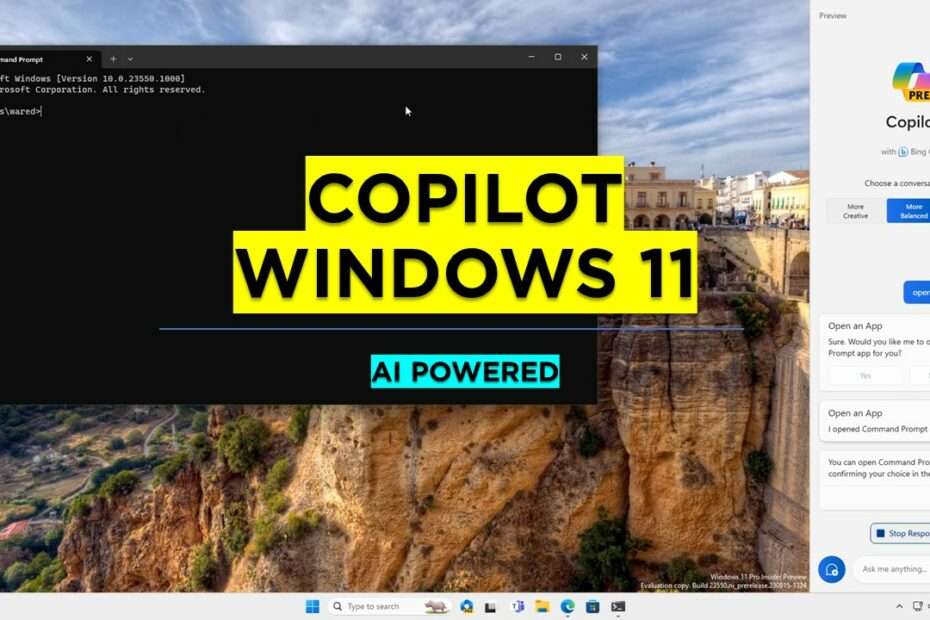During the keynote presentation for Microsoft’s AI and Surface event, the corporate vice president of Microsoft Devices, drew a striking comparison between the impact of AI and the early days of the Internet, declaring, “It’s the next era“. Kyriacou’s statement underscores the profound transformation that AI is poised to bring across various industries, much like the internet revolutionized the world in its infancy. With this sentiment, Microsoft emphasizes the significant role AI plays in shaping the future, signaling the company’s commitment to driving innovation and advancements in the AI field, and showcasing their dedication to integrating AI into their products and services to benefit users worldwide.
Microsoft is embarking on a new era with the introduction of Copilot, a versatile digital assistant unveiled during a recent event. This AI-driven tool operates akin to an intelligent chatbot and is designed to assist users in various tasks, from configuring their PC settings to discovering the perfect music playlist. Scheduled for release with the upcoming Windows 11 update on September 26, Copilot is set to become a systemwide feature, seamlessly integrating with a range of applications, including Bing and Edge. This innovation signifies Microsoft’s commitment to enhancing user experiences and streamlining productivity by harnessing the power of AI to simplify everyday computing tasks and activities.
Microsoft’s Copilot promises to usher in a transformative era of convenience and efficiency for Windows 11 users. With its widespread functionality and integration across essential apps, this digital assistant aims to be a valuable addition to the Windows ecosystem. As the technology continues to evolve, users can anticipate a more intuitive and streamlined computing experience, facilitated by Copilot’s AI-driven capabilities, which will undoubtedly shape the way they interact with their Windows laptops and other devices.
Microsoft’s Copilot introduces a new level of convenience for PC users by simplifying the navigation of their computers. Instead of delving into complex settings menus, Copilot offers an intuitive solution. During a demonstration, a company representative showcased its capabilities by typing the command “Snap my windows” into Copilot’s text field. This simple action effectively organized the multitude of apps currently running on the PC, highlighting Copilot’s potential as a helpful assistant for streamlining tasks and enhancing user productivity.
The example illustrates how Copilot leverages text-based commands to execute actions, making it easier for users to manage their PCs efficiently. With Copilot’s assistance, users can expect to spend less time navigating through menus and more time focusing on their work or leisure activities, emphasizing Microsoft’s commitment to delivering AI-driven solutions that enhance the user experience on Windows laptops and devices.
Microsoft’s history with virtual assistants has seen mixed success compared to its competitors. However, Pete Kyriacou, corporate vice president of Microsoft Devices, is optimistic that their latest offering, Microsoft Copilot, will break away from this pattern. Unlike previous attempts, Copilot, along with other emerging agents, possesses context-aware capabilities that enable a higher level of proactivity compared to the voice-activated virtual assistants that have become familiar over the past decade.
Kyriacou’s optimism reflects Microsoft’s commitment to advancing virtual assistant technology and making it more intuitive and efficient for users. By harnessing context awareness, Copilot has the potential to provide more personalized and relevant assistance, ultimately offering a unique and improved user experience. This shift in approach signifies Microsoft’s determination to stay at the forefront of AI-driven virtual assistant development, promising a more proactive and responsive tool for users in the near future.
Pete Kyriacou highlighted the significant shift in user experience facilitated by newer virtual assistants like Copilot. He pointed out that with older voice-enabled assistants, users were burdened with the cognitive load of formulating questions or initiating conversations from scratch. However, the advent of agents like Copilot represents a transformation in this regard, as they possess the capability to gently guide users in the right direction, reducing the need for users to actively generate queries and fostering a more natural and seamless interaction.
Kyriacou’s observation underscores the evolution of virtual assistant technology towards greater user-friendliness and intuitiveness. By proactively assisting users and providing context-aware recommendations, Copilot and similar AI agents are poised to streamline the way people interact with their devices, making tasks and information retrieval more efficient and less mentally taxing.
Microsoft’s anticipation of AI’s greater significance in laptops aligns with the broader industry trend towards incorporating artificial intelligence into various aspects of computing. As AI continues to advance, users can expect laptops to offer increasingly intelligent features and capabilities, making them more versatile tools for productivity, entertainment, and everyday tasks. This strategic approach by Microsoft reflects their dedication to staying at the forefront of technological innovation and delivering cutting-edge solutions to meet the evolving demands of the modern user.
By likening AI to the early internet era, it highlights the wide-reaching impact AI is expected to have on society, economy, and technology. Microsoft’s focus on AI in its event demonstrates the company’s vision to harness this transformative force, making it a key player in shaping the AI landscape and solidifying its commitment to delivering cutting-edge AI-driven solutions to its customers.
Maybe you like other articles?

